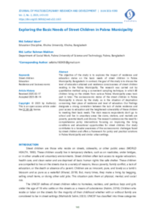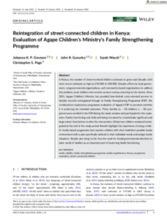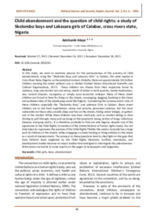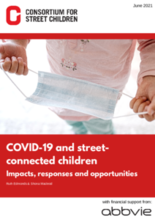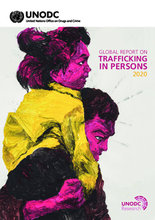Displaying 11 - 20 of 228
The objective of the study is to explore the impact of residence and education status on the basic needs of street children in Pabna Municipality, Bangladesh.
This study found that parental poverty is a key factor pushing children in Akwa Ibom State, Nigeria into street life, where deprivation drives them to engage in delinquent activities such as theft, drug peddling, and begging. The findings highlight urgent gaps in child welfare and social protection, calling for targeted interventions to address poverty, improve access to education and healthcare, and strengthen support systems.
This is a program evaluation of Agape Children's Ministry's Family Strengthening Programme in western Kenya that works to reunite children from the streets with their families.
This is a recording of the first session in a webinar series celebrating the launch of of a themed issue of Global Childhood Studies journal (Volume.2; Issue.1). This first webinar focuses on Responding to varied experiences of childhood separation.
This article explores the role resilience processes play in education and well-being outcomes for street-connected children. It draws on research and practice undertaken as part of the Building with Bamboo Programme (BwB) on resilience. BwB investigated the forms a resilience-based approach might usefully take in practice, the effect this has on promoting resilience in children, and how this resilience leads to improved outcomes in their lives.
This study examined the reasons for the pervasiveness of the practice of child abandonment, using the “Skolombo Boys and Lakasara Girls’’ in Calabar, the state capital of Cross River State, Nigeria, as the analytical context.
These presentations from Hope and Homes for Children, Miracle Foundation and Railway Children were delivered during the August 20, 2021, workshop of the Care Measurement Task Force of the Transforming Children's Care Global Collaborative Platform. The focus of the workshop was child and family outcome measurement.
This overview considers the effect of the pandemic on street-connected children, meaning those who live or work on or have another strong connection to the street, and those who work with them. It draws on data gathered from members of the Consortium for Street Children’s network of over 180 community organisations, national and international non-governmental organisations, researchers, advocates and on-the-ground practitioners working in 135 countries.
The two primary objectives of this study were 1) to compare recent child abuse (physical, emotional, and sexual) between orphaned and separated children and adolescents’ (OSCA) living in institutional environments and those in family-based care; and 2) to understand how recent child abuse among street-connected children and youth compared to these other vulnerable youth populations.
This report draws on data from 148 countries and explores issues of particular relevance in the current crisis, including the impact of socio-economic factors, drivers of child trafficking and trafficking for forced labour, and traffickers’ use of the internet.

